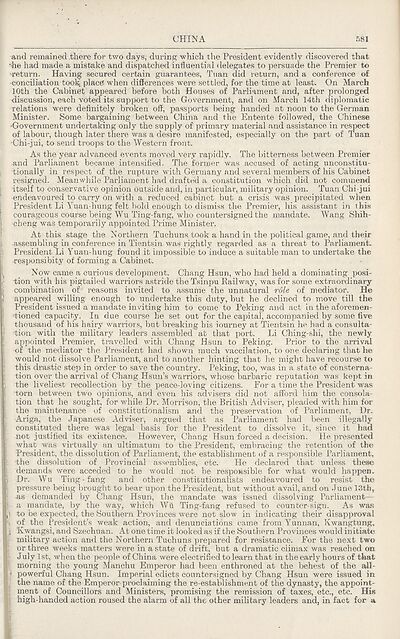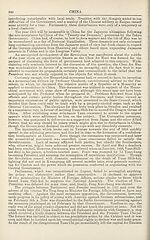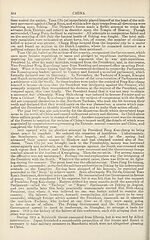1924
(647) Page 581
Download files
Complete book:
Individual page:
Thumbnail gallery: Grid view | List view

CHINA
f>81
and remained there for two days, during which the President evidently discovered that
'he had made a mistake and dispatched influential delegates to persuade the Premier to
•return. Having secured certain guarantees, Tuan did return, and a conference of
•conciliation tookplace when differences were settled, for the time at least. On March
10th the Cabinet appeared before both Houses of Parliament and, after prolonged
discussion, each voted its support to the Government, and on March 14th diplomatic
relations were definitely broken off, passports being handed at noon to the German
Minister. Some bargaining between China and the Entente followed, the Chinese
^Government undertaking only the supply of primary material and assistance in respect
of labour, though later there was a desire manifested, especially on the part of Tuan
■Chi-jui, to send troops to the Western front.
As the year advanced events moved very rapidly. The bitterness between Premier
-and Parliament became intensified. The former was accused of acting unconstitu¬
tionally in respect of the rupture with Germany and several members of his Cabinet
resigned. Meanwhile Parliament had drafted a constitution which did not commend
itself to conservative opinion outside and, in particular, military opinion. Tuan Chi-jui
endeavoured to carry on with a reduced cabinet but a crisis was precipitated when
President Li Yuan-hung felt bold enough to dismiss the Premier, his assistant in this
courageous course being Wu Ting-fang, who countersigned the mandate. Wang Shih-
•cheng was temporarily appointed Prime Minister.
At this stage the Northern Tuchuns took a hand in the political game, and their
assembling in conference in Tientsin was rightly regarded as a threat to Parliament.
President Li Yuan-hung found it impossible to induce a suitable man to undertake the
responsibity of forming a Cabinet.
Now came a curious development. Chang Hsun, who had held a dominating posi¬
tion with his pigtailed warriors astride the Tsinpu Railway, was for some extraordinary
combination of reasons invited to assume the unnatural role of mediator. He
appeared willing enough to undertake this duty, but he declined to move till the
President issued a mandate inviting him to come to Peking and act in the aforemen¬
tioned capacity. In due course he set out for the capital, accompanied by some five
thousand of his hairy warriors, but breaking his iourney at Tientsin he had a consulta¬
tion with the military leaders assembled at that port. Li Ching-shi, the newly
appointed Premier, tivaveiled with Chang Hsun to Peking. Prior to the arrival
of the mediator the President had shown much vaccilation, to one declaring that he
would not dissolve Parliament, and to another hinting that he might have recourse to
this drastic step in order to save the country. Peking, too, was in a state of consterna¬
tion over the arrival of Chang Hsun’s warriors, whose barbaric reputation was kept in
the liveliest recollection by the peace-loving citizens. For a time the President was
torn between two opinions, and even his advisers did not afford him the consola¬
tion that he sought, for while Dr. Morrison, the British Adviser, pleaded with him for
the maintenance of constitutionalism and the preservation of Parliament, Dr.
Ariga, the Japanese Adviser, argued that as Parliament had been illegally
constituted there was legal basis for the President to dissolve it, since it had
•not justified its existence. However, Chang Hsun forced a decision. He presented
what was virtually an ultimatum to the President, embracing the retention of the
President, the dissolution of Parliament, the establishment of a responsible Parliament,
the dissolution of Provincial assemblies, etc. He declared that unless these
demands were acceded to he would not be responsible for what would happen.
Dr. Wu Ting-fang and other constitutionalists endeavoured to resist the
pressure being brought to bear upon the President, but without avail, and on June 13th,
as demanded by Chang Hsun, the mandate was issued dissolving Parliament—
a mandate, by the way, which Wk Ting-fang refused to counter-sign. As was
to be expected, the Southern Provinces were not slow in indicating their disapproval
of the President’s weak action, and denunciations came from Yunnan, Xwangtung,
Ivwangsi, and Szechuan. At one time it looked as if the Southern Provinces would initiate
military action and the Northern Tuchuns prepared for resistance. For the next two
or thi’ee weeks matters were in a state of drift, but a dramatic climax was reached on
July 1st, when the people of China were electrified to learn that in the early hours of that
morning the young Manchu Emperor had been enthroned at the behest of the all-
) powerful Chang Hsun. Imperial edicts countersigned by Chang Hsun were issued in
the name of the Emperor proclaiming the re-establishment of the dynasty, the appoint¬
ment of Councillors and Ministers, promising the remission of taxes, etc., etc. His
high-handed action roused the alarm of all the other military leaders and, in fact for a
f>81
and remained there for two days, during which the President evidently discovered that
'he had made a mistake and dispatched influential delegates to persuade the Premier to
•return. Having secured certain guarantees, Tuan did return, and a conference of
•conciliation tookplace when differences were settled, for the time at least. On March
10th the Cabinet appeared before both Houses of Parliament and, after prolonged
discussion, each voted its support to the Government, and on March 14th diplomatic
relations were definitely broken off, passports being handed at noon to the German
Minister. Some bargaining between China and the Entente followed, the Chinese
^Government undertaking only the supply of primary material and assistance in respect
of labour, though later there was a desire manifested, especially on the part of Tuan
■Chi-jui, to send troops to the Western front.
As the year advanced events moved very rapidly. The bitterness between Premier
-and Parliament became intensified. The former was accused of acting unconstitu¬
tionally in respect of the rupture with Germany and several members of his Cabinet
resigned. Meanwhile Parliament had drafted a constitution which did not commend
itself to conservative opinion outside and, in particular, military opinion. Tuan Chi-jui
endeavoured to carry on with a reduced cabinet but a crisis was precipitated when
President Li Yuan-hung felt bold enough to dismiss the Premier, his assistant in this
courageous course being Wu Ting-fang, who countersigned the mandate. Wang Shih-
•cheng was temporarily appointed Prime Minister.
At this stage the Northern Tuchuns took a hand in the political game, and their
assembling in conference in Tientsin was rightly regarded as a threat to Parliament.
President Li Yuan-hung found it impossible to induce a suitable man to undertake the
responsibity of forming a Cabinet.
Now came a curious development. Chang Hsun, who had held a dominating posi¬
tion with his pigtailed warriors astride the Tsinpu Railway, was for some extraordinary
combination of reasons invited to assume the unnatural role of mediator. He
appeared willing enough to undertake this duty, but he declined to move till the
President issued a mandate inviting him to come to Peking and act in the aforemen¬
tioned capacity. In due course he set out for the capital, accompanied by some five
thousand of his hairy warriors, but breaking his iourney at Tientsin he had a consulta¬
tion with the military leaders assembled at that port. Li Ching-shi, the newly
appointed Premier, tivaveiled with Chang Hsun to Peking. Prior to the arrival
of the mediator the President had shown much vaccilation, to one declaring that he
would not dissolve Parliament, and to another hinting that he might have recourse to
this drastic step in order to save the country. Peking, too, was in a state of consterna¬
tion over the arrival of Chang Hsun’s warriors, whose barbaric reputation was kept in
the liveliest recollection by the peace-loving citizens. For a time the President was
torn between two opinions, and even his advisers did not afford him the consola¬
tion that he sought, for while Dr. Morrison, the British Adviser, pleaded with him for
the maintenance of constitutionalism and the preservation of Parliament, Dr.
Ariga, the Japanese Adviser, argued that as Parliament had been illegally
constituted there was legal basis for the President to dissolve it, since it had
•not justified its existence. However, Chang Hsun forced a decision. He presented
what was virtually an ultimatum to the President, embracing the retention of the
President, the dissolution of Parliament, the establishment of a responsible Parliament,
the dissolution of Provincial assemblies, etc. He declared that unless these
demands were acceded to he would not be responsible for what would happen.
Dr. Wu Ting-fang and other constitutionalists endeavoured to resist the
pressure being brought to bear upon the President, but without avail, and on June 13th,
as demanded by Chang Hsun, the mandate was issued dissolving Parliament—
a mandate, by the way, which Wk Ting-fang refused to counter-sign. As was
to be expected, the Southern Provinces were not slow in indicating their disapproval
of the President’s weak action, and denunciations came from Yunnan, Xwangtung,
Ivwangsi, and Szechuan. At one time it looked as if the Southern Provinces would initiate
military action and the Northern Tuchuns prepared for resistance. For the next two
or thi’ee weeks matters were in a state of drift, but a dramatic climax was reached on
July 1st, when the people of China were electrified to learn that in the early hours of that
morning the young Manchu Emperor had been enthroned at the behest of the all-
) powerful Chang Hsun. Imperial edicts countersigned by Chang Hsun were issued in
the name of the Emperor proclaiming the re-establishment of the dynasty, the appoint¬
ment of Councillors and Ministers, promising the remission of taxes, etc., etc. His
high-handed action roused the alarm of all the other military leaders and, in fact for a
Set display mode to:
![]() Universal Viewer |
Universal Viewer | ![]() Mirador |
Large image | Transcription
Mirador |
Large image | Transcription
Images and transcriptions on this page, including medium image downloads, may be used under the Creative Commons Attribution 4.0 International Licence unless otherwise stated. ![]()
| Asian directories and chronicles > 1924 > (647) Page 581 |
|---|
| Permanent URL | https://digital.nls.uk/196432294 |
|---|
| Attribution and copyright: |
|
|---|---|
| Description | Volumes from the Asian 'Directory and Chronicle' series covering 1917-1941, but missing 1919 and 1923. Compiled annually from a multiplicity of local sources and research. They provide listings of each country's active corporations, foreign residents and government agencies of all nationalities for that year, together with their addresses. Content includes: various treaties; coverage of conflicts; currencies and taxes; consular fees; weights and measures; public holidays; festivals and traditions. A source of information for both Western states and communities of foreigners living in Asia. Published by Hongkong Daily Press. |
|---|---|
| Shelfmark | H3.86.1303 |
| Additional NLS resources: |

